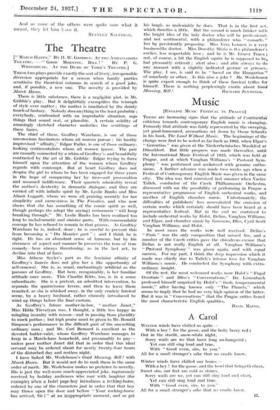The Theatre
[" MARCH HARES." BY H. W. GRIBBLE. AT THE AMBASSADORS THEATRE.---:" GOOD MORNING, BILL ! " BY P. G. WODEIIOUSE. AT THE DUKE OF YORK'S THEATRE.]
THESE two plays provide exactly the sort of lively, irresponsible diversio-n- appropriate for a season when family parties scrutinize the theatrical columns in search of a good joke, and, if possible, a new one. The novelty is provided by March Hares.
There is little substance, there is a negligible plot, in Mr. Gribble's play. But it delightfully exemplifies the triumph of style over matter; the matter is irradiated by the dainty touch of fantasy. Nobody does anything in the least probable ; everybody, confronted with an improbable situation, says things that sound real, or plausible. A certain solidity of amusingly sketched character underlies the scuttling,s of these hares.
The chief of them, Geoffrey Wareham, is one of those unconscious fascinators whom all women pursue ; his hastily improvised "affinity," Edgar Fuller, is one of those ordinary- looking sentimentalists whom all women ignore. The pair are casually connected by a whim of Geoffrey's, and beautifully contrasted by the art of Mr. Gribble—Edgar trying to force himself upon the attention of the women whom Geoffrey regards with contempt. But at heart Geoffrey does not despise the girl to whom he has been engaged for three years in the hope of conquering her by incessant provocation and assumed indifference. Their quarrels admirably reveal the author's dexterity in dramatic dialogue, and they are carried off with infinite spirit by Mr. Leslie Banks and Miss Alison Leggatt, whom we were all praising recently for her simplicity and earnestness in The Fanatics, and who now shows that she has something of the comic spirit as well, though perhaps (to adapt the saying) seriousness " Nall keep breaking through." Mr. Leslie Banks has been confined too long to melodramatic and sinister parts. With commendable courage he has refused to remain in that groove. As Geoffrey Wareham he is, indeed, dour ; he is careful to prevent this from becoming a "Du Maurier part" ; and I think he is right. He has an abundant sense of humour, but by his sternness of aspect and manner he preserves the tone of true comedy—here always threatening, as in the last act, to decline into that of farce.
Miss Athene Seyler's part as the feminine affinity of Geoffrey's fiancee does not give her a like opportunity of self-renewal. She is, as usual, enchantingly artificial as the pursuer of Geoffrey. But here, recognizably, is her familiar attitude once more. This Claudia Kitts, too, is in a sense subordinate. She is a pretext, an admitted intervention, to separate the quarrelsome lovers, and then to leave them reunited, as she is whisked away, in the only crudely farcical scene, by a heavy husband, rather clumsily introduced to wind up things before the final curtain.
As Geoffrey's future mother-in-law, "mother Janet," Miss Hilda Trevelyan was, I thought, a little less happy in mingling insanity with reason—and in passing from placidity to mock pathos ; but high praise must be given to Mr. Ronald Simpson's performance in the difficult part of the unexciting ordinary man ; and Mr. Carl Bernard is excellent as the devoted butler-valet, whom Geoffrey Wareham manages to keep in a March-hare household, and presumably to pay— unless poor mother Janet did that in order that' this ideal servant may be ordered about for nearly twenty-four hours of the disturbed day and restless night.
I have linked Mr. Wodehouse's Good Morning, Bill! with March Hares. But it would not do to rank them in the same order of merit. Mr. Wodehouse makes no pretence to novelty. His is just the well-worn much-appreciated joke, rapturously received by holiday audiences who roar with laughter (for example) when a hotel page-boy introduces a rocking-horge, ordered by one of the characters just in order that that boy may throw open the door and bellow "Your rocking-horse has arrived, Sir " at an inappropriate moment, and so get his laugh, as undeniably he does. . That is in the first act, which dawdles a little. But the second is much brisker with the bright idea of the lady doctor who will be professional, and not sentimental, with a philanderer who " consults " her by persistently proposing. Miss Vera Lennox is a very businesslike doctor. Miss Dorothy Minto is the philanderer's earlier, less respectable love ; and he is Mr. Ernest Truex ; not, of course, a bit the English squire he is supposed to be, but pleasantly reticent ; alert also ; and able always to do any amount with a slightly indicated gesture or grimace. The play, I see, is said to be "based on the Hungarian" of somebody or other. Is this also a joke ? Mr. Wodehouse is quite expert enough to think of these farcical trifles for himself. There is nothing perplexingly exotic about Good






























 Previous page
Previous page